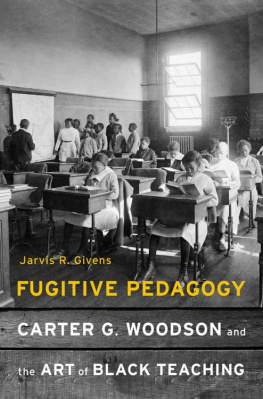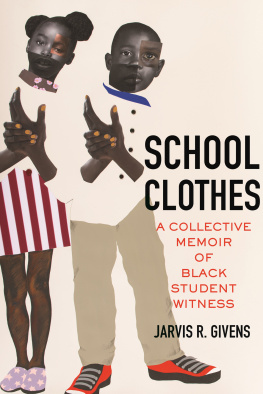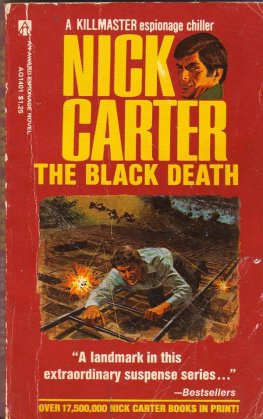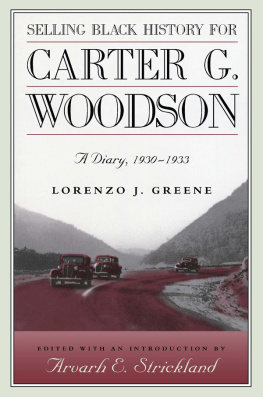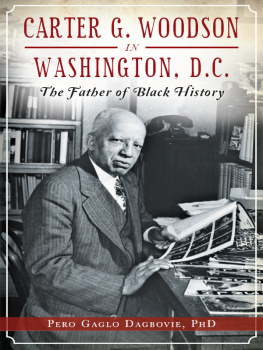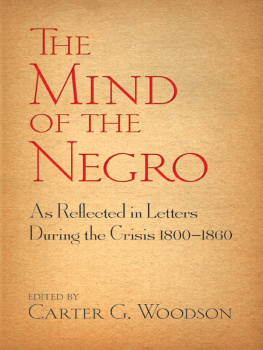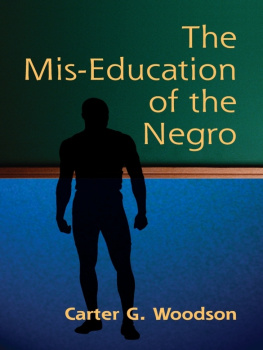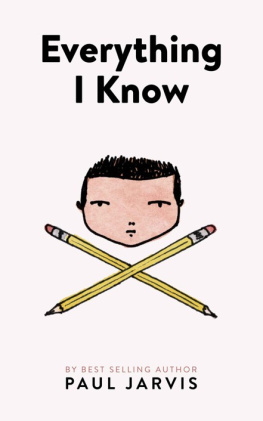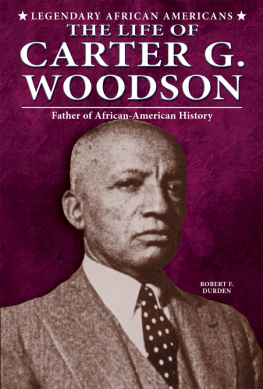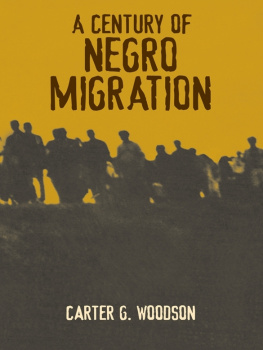Jarvis R. Givens - Fugitive pedagogy : Carter G. Woodson and the art of Black teaching
Here you can read online Jarvis R. Givens - Fugitive pedagogy : Carter G. Woodson and the art of Black teaching full text of the book (entire story) in english for free. Download pdf and epub, get meaning, cover and reviews about this ebook. year: 2021, genre: Religion. Description of the work, (preface) as well as reviews are available. Best literature library LitArk.com created for fans of good reading and offers a wide selection of genres:
Romance novel
Science fiction
Adventure
Detective
Science
History
Home and family
Prose
Art
Politics
Computer
Non-fiction
Religion
Business
Children
Humor
Choose a favorite category and find really read worthwhile books. Enjoy immersion in the world of imagination, feel the emotions of the characters or learn something new for yourself, make an fascinating discovery.
- Book:Fugitive pedagogy : Carter G. Woodson and the art of Black teaching
- Author:
- Genre:
- Year:2021
- Rating:5 / 5
- Favourites:Add to favourites
- Your mark:
- 100
- 1
- 2
- 3
- 4
- 5
Fugitive pedagogy : Carter G. Woodson and the art of Black teaching: summary, description and annotation
We offer to read an annotation, description, summary or preface (depends on what the author of the book "Fugitive pedagogy : Carter G. Woodson and the art of Black teaching" wrote himself). If you haven't found the necessary information about the book — write in the comments, we will try to find it.
Fugitive pedagogy : Carter G. Woodson and the art of Black teaching — read online for free the complete book (whole text) full work
Below is the text of the book, divided by pages. System saving the place of the last page read, allows you to conveniently read the book "Fugitive pedagogy : Carter G. Woodson and the art of Black teaching" online for free, without having to search again every time where you left off. Put a bookmark, and you can go to the page where you finished reading at any time.
Font size:
Interval:
Bookmark:
Fugitive Pedagogy
CARTER G. WOODSON AND THE ART OF BLACK TEACHING
Jarvis R. Givens
HARVARD UNIVERSITY PRESS
Cambridge, Massachusetts, and London, England 2021
Copyright 2021 by the President and Fellows of Harvard College
All rights reserved
Publication of this book has been supported through the generous provisions of the Maurice and Lula Bradley Smith Memorial Fund
Cover photographs: (top) Students in geography class at Thaddeus Stevens School, fresh air class. Retrieved from the Library of Congress, https://www.loc.gov/item/93502643/; (bottom) ultramarinfoto/E+/Getty Images.
Cover design: Jill Breitbarth
978-0-674-98368-7 (cloth)
978-0-674-25909-6 (EPUB)
978-0-674-25910-2 (PDF)
The Library of Congress has cataloged the printed edition as follows:
Names: Givens, Jarvis R., author.
Title: Fugitive pedagogy : Carter G. Woodson and the art of black teaching / Jarvis R. Givens.
Description: Cambridge, Massachusetts : Harvard University Press, 2021. | Includes index.
Identifiers: LCCN 2020042439
Subjects: LCSH: Woodson, Carter Godwin, 1875-1950. | African AmericansEducationHistory20th century. | Critical pedagogyUnited StatesHistory20th century. | African American teachersHistory20th century.
Classification: LCC LC2741 .G48 2021 | DDC 973/.0496073007202dc23
LC record available at https://lccn.loc.gov/2020042439
For the horrors of the American Negros life there has been almost no language.
JAMES BALDWIN, The Fire Next Time (1963)
Our language, when it comes to black education, is impoverished. Knowing how education has been a site of deep hurt and suffering on the one hand and yet a sacred site of black spiritual strivings on the other, we might look to more precise grammar to name and wrestle with this embattled reality. I desired a way to write about education as black people experienced it, in the interstices of this liminal realitywedged between their collective striving and the antiblack domination they sought to escapea way of writing that would account for the intentional ways black people navigated these deeply violent contexts and dreamed up new worlds and new ways of being. The problem of language is one that plagues black education studies and one that is widespread in the academy more generally, because for so long black life has been a problem for thought. Only language that goes beyond the descriptive can aid the observer who desires to sift through such a lived paradox and the futures it structured. But not just any language will do.
James Baldwin pointed us to a source: The privacy of [the American Negros] experience, which is only beginning to be recognized in language, and which is denied or ignored in official and popular speechhence the Negro idiomlends credibility to any system that pretends to clarify it.
As such, this book relies on the fugitive slave archetype, and on fugitive pedagogya term that is neither (to borrow from folklorists) fully emic (from within) nor etic (from without) but a hybrid of the two. The fugitive slave emerged as a folk hero and cultural symbol in curriculums developed by black teachers. The fugitive slave appeared in school naming practices and within commemorative ceremonies in school activities and rituals. Black Americans established a heroic tradition around the stories and names associated with this pedagogy of escape in their schools and classrooms. As a folk hero in black curricular imaginations, the fugitive slave carried important insights about the interior life of teachers and students. This was the fugitive spirit of black education, to borrow from the poet and literary critic Nathaniel Mackey. Fugitive spirit was fact, metaphor, and formal disposition in black literary practices and (I extend this to include) black education more broadly.
As I put closure on my research in the African American Studies Department at the University of California, Berkeley, I realized that to truly appreciate Carter G. Woodson or his iconic 1933 book, The Mis-education of the Negro, required a serious engagement with the veiled world of black education and black teachers only partially visible to the white public of their time and the historical record left behind. The black teachers and students called on in this book became portals into a heritage of fugitive pedagogy. I hope to tell their story in a way that moves beyond mere description and narratives of heroic struggle, and instead tease out central conflicts pertaining to questions of black ontology and the deeper meaning of education in black peoples struggle for human goodness and flourishing: for a new world to be and new ways to be in the world. As Toni Morrison showed through her fictional character Sixo: a language is only worth speaking or writing or singing if you can see a future in it. I look to black teachers of the past, whose fugitive acts can teach us so much about the future. They represent a tradition that has been plundered from todays black educators, who are its rightful inheritors. I see the cast of characters in this book as standard bearers. A tradition passed through these teachers and their students. Their heritage is one worthy of both praise and deep study.
How some of these slaves learned in spite of opposition makes a beautiful story. Knowing the value of learning as a means of escape and having longing for it, too, because it was forbidden, many slaves continued their education under adverse circumstances.
C ARTER G . W OODSON, The Negro in Our History (1922)
But some of us would try to steal
A little from the book.
And put the words together,
And learn by hook or crook.
Learning to Read (1853)
FRANCES ELLEN WATKINS HARPER, teacher and abolitionist
Tessie McGee read to her class in a steady measured tone, quietly engaging in a calculated act of subversion. She was black, twenty-eight years old, and taught history in 19331934 at the only black secondary school in Webster Parish, Louisiana.

Webster Parish Training School, Minden, Louisiana. Fisk University, John Hope and Aurelia E. Franklin Library, Julius Rosenwald Photo Collection.
The scenario from Miss McGees classroom illuminates what this book calls fugitive pedagogy. My use of the term fugitive draws inspiration from the literary scholars Steven Bests and Saidiya Hartmans discussion of fugitive justice. Although focused on slavery, redress, and the historicity of what is lost and irrecoverable in the future, Best and Hartman introduce the idea of two competing narratives of the fugitives identity. Fugitive connotes the dual image of one who escapes enslavement or jailed confinement, which justifies ones capture and even death at the hands of law enforcement. Yet as Best and Hartman explain, the violence of enslavement, legal capture, and brutality engenders, as well, the countervailing narrative of and by the fugitive as victim of antiblack domination. Adapting such a conceptualization to American education reveals parallel, equally competing historical images. On the one hand, the dominant story of the nations past had long vilified, devalued, and disrespected black people, thereby justifying racial discrimination in the forms of enslavement and later segregation, disfranchisement, lynching, and imprisonment. On the other hand, this very exclusion, violence, and confinement in a land that professed the ideals of liberty and justice for all prompted a counterhistorical narrative and way of knowingindeed one represented in the extensive factual evidence contained in Carter G. Woodsons books, which documented the wrongs done to black Americans but also their achievements and contributions to the modern world. And as the case of Tessie McGee makes clear, much of this type of black education occurred in a covert manner.
Font size:
Interval:
Bookmark:
Similar books «Fugitive pedagogy : Carter G. Woodson and the art of Black teaching»
Look at similar books to Fugitive pedagogy : Carter G. Woodson and the art of Black teaching. We have selected literature similar in name and meaning in the hope of providing readers with more options to find new, interesting, not yet read works.
Discussion, reviews of the book Fugitive pedagogy : Carter G. Woodson and the art of Black teaching and just readers' own opinions. Leave your comments, write what you think about the work, its meaning or the main characters. Specify what exactly you liked and what you didn't like, and why you think so.

